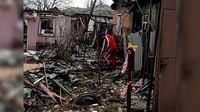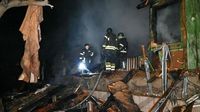In a devastating overnight attack on March 30, 2025, Russian drones targeted a military hospital in Kharkiv, Ukraine’s second-largest city, resulting in the deaths of two individuals and injuring at least 35 others. This assault is part of a broader series of strikes that have intensified amid ongoing conflict between Ukraine and Russia, raising alarms over the humanitarian implications and the potential for further escalation.
According to Ukraine's Air Force, the assault involved a total of 111 drones and one ballistic missile launched by Russian forces. In a commendable display of defense, Ukrainian air defenses managed to shoot down 65 of those drones, while an additional 35 drones went off radar, likely due to electronic jamming efforts employed by Russian forces. The attack was not only focused on military installations; it also struck civilian areas, including a shopping center and residential buildings, leading to significant damage and casualties.
Governor Oleh Syniehubov of Kharkiv reported that among the injured were five children, and one of the deceased has been identified as a 67-year-old man, while the other was a 70-year-old woman. The assault has left many in shock, with one survivor, Anton, recounting the harrowing moment of the strike. He described running to an adjacent room just as the drone hit, narrowly avoiding severe injury. “I had already bid farewell to life,” he stated, reflecting the grim reality faced by civilians in conflict zones.
In addition to the casualties in Kharkiv, reports indicate that one person was injured in Rodynske, located in the Donetsk Oblast. The attack has drawn condemnation from Ukrainian leaders, with President Volodymyr Zelenskyy urging allies for a stronger response to such acts of aggression. He emphasized the need for continued support from the U.S. and other nations, noting that Moscow has launched more than 1,000 drones in the past week alone.
As the situation unfolds, European leaders have pledged to bolster Ukraine's military capabilities. At a recent summit in Paris, they vowed to strengthen Kyiv’s army amidst growing concerns over Russia's ongoing military operations. French Foreign Affairs Minister Jean-Noel Barrot highlighted the gravity of the situation, stating, “Ukraine has agreed to the cease-fire proposed by the United States. But Russia continues its war crimes, just yesterday in Kharkiv.” His remarks underscore the urgent need for international attention and action in light of the latest attacks.
The strikes on March 30 have further complicated the already tense atmosphere, with both sides accusing each other of violating ceasefire agreements. Russia's Defense Ministry claimed that its forces had successfully struck 140 districts across Ukraine, targeting military airfields and ammunition depots, but did not acknowledge the attack on the hospital.
In the wake of these events, Zelenskyy has warned of an impending Russian offensive, suggesting that the Kremlin is preparing to escalate its military operations in a bid to strengthen its negotiating position in any potential ceasefire talks. This warning comes as Ukraine continues to maintain active operations to thwart Russian advances, particularly in the Sumy and Kharkiv regions.
As the conflict drags on, the humanitarian toll is mounting. The strikes have not only resulted in immediate casualties but have also left many families displaced and in need of urgent assistance. Mayor Ihor Terekhov of Kharkiv reported that the attack caused damage to several dozen residential buildings and a dormitory sheltering war refugees, exacerbating the already dire conditions faced by those affected by the ongoing war.
In light of the recent escalation, the international community is grappling with the implications of Russia's actions. Analysts suggest that the continued drone attacks are part of a broader strategy by Moscow to maintain pressure on Ukraine while seeking leverage in negotiations. The situation remains fluid, with both sides preparing for further confrontations.
As the dawn broke on March 30, the aftermath of the strikes left a stark reminder of the conflict’s brutality. With the death toll rising and the number of injured climbing, the need for a resolution to the ongoing war has never been more urgent. The international community watches closely, with calls for accountability and justice growing louder in the wake of these attacks.
The events of March 30 have reignited discussions about the need for a comprehensive peace effort, as leaders in Kyiv and beyond seek to navigate the complex landscape of diplomacy and military strategy. As President Zelenskyy continues to advocate for stronger support from allies, the future of Ukraine hangs in the balance, with the specter of further violence looming large.







